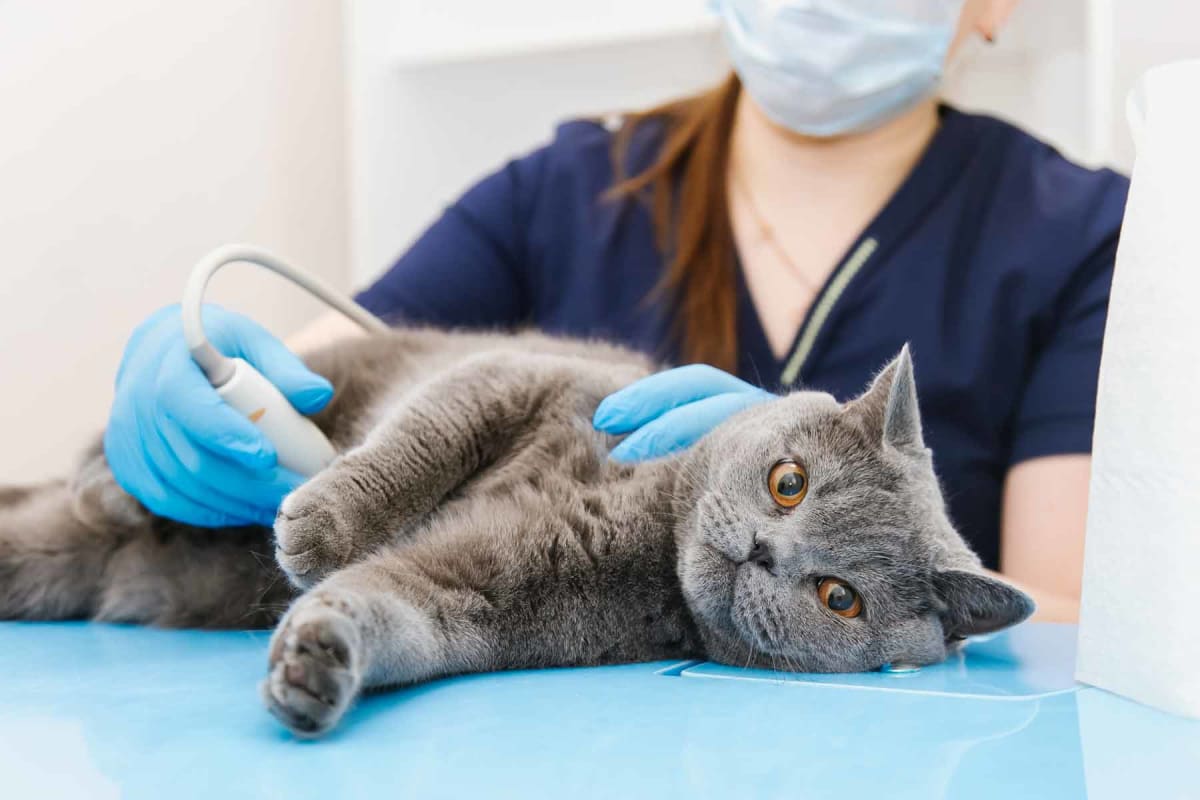
How much does a cat ultrasound cost?
How much does a cat ultrasound cost?
$200 – $600 average total cost
Average cost of an ultrasound for a cat
A cat ultrasound costs $200 to $400 on average at a vet’s office or $300 to $600 at a specialty veterinary hospital. Your vet may need to use an ultrasound to diagnose a heart murmur, abdominal blockage, issues with the bladder or kidneys, or to monitor a pregnancy.

| Facility type | Average total cost |
|---|---|
| Veterinary clinic | $200 – $400 |
| Specialist | $300 – $600 |
Veterinary clinic
General veterinary clinics typically charge $200 to $400 for an ultrasound. These clinics often use standard equipment, and general practitioners may not have specialized experience performing or reading ultrasound scans.
Specialist
Specialists or veterinary cardiologists charge about $400 to $600 to perform an ultrasound and diagnose your cat. These professionals have more experience, training, and certifications related to interpreting ultrasound images.
What is an ultrasound for cats?
An ultrasound, or sonogram, is a diagnostic test that shows an image of your cat’s internal organs. Ultrasounds use harmless, noninvasive sound waves to scan the cat's body and create an image. This scan can help the veterinarian diagnose and treat your cat.
Feline ultrasound cost factors
Several factors influence the cost of an ultrasound for a cat, including:
Your location: Veterinarians typically charge more in urban areas and towns with a higher cost of living.
Insurance: Pet insurance costs $15 to $75 per month and often cover ultrasounds, depending on your policy and the reason for the scan. For example, some plans don't cover pregnancy-related expenses because they try to encourage spaying and neutering pets.
Consultation: Some vets require a separate consultation visit before the ultrasound and charge extra, while others don't.
Anesthesia: If your cat can't stay still enough during the ultrasound to get a clear picture, your vet may need to use anesthesia, which will raise costs.
Follow-ups: If your cat needs to come back for another procedure or a checkup visit later, you'll pay separately for that visit. The average vet visit costs $40 to $80.
Additional services
Other operations or an overnight stay will increase the total cost. Common procedures for cats and their accompanying costs include:
Cat vaccinations cost $10 to $45 per dose.
Microchipping a cat costs $20 to $60.
Spaying or neutering a cat costs $200 to $500 at a private vet's office.
A cat intestinal blockage surgery costs $1,500 to $12,000+.
Reasons for a cat ultrasound
There are many different reasons your vet may order an ultrasound for your cat, such as:
Diagnosing a problem with a kidney, liver, or heart
Monitoring an existing health condition
Observing a pregnancy
Looking for foreign objects
Checking for internal bleeding
Examining a cyst, tumor, or growth
What to expect
Your vet will give you instructions based on the reason for the scan and your cat's condition. In some cases, you'll need to withhold food before the procedure. Most vets will shave a small section of your cat's fur on their abdomen to get an accurate picture.
Then they will use a clear gel and ultrasound wand on the cat's belly to get a scan. You may or may not be able to stay with your cat during the ultrasound.

Cat ultrasound FAQs
How long should a cat fast before an ultrasound?
Your vet may ask you to keep your cat from eating or drinking anything for 8 to 12 hours before the procedure, depending on which body part they need to scan. However, your cat won't need to fast in many cases. Your vet will tell you what's best before your appointment.
Can cats hear ultrasound machines?
No, cats cannot hear ultrasound machines. Cats can hear frequencies from about 45 to 85 kHz, and ultrasounds operate around 2,000 to 15,000 kHz. Your cat might be bothered by the electrical or keyboard sounds nearby, but the ultrasound itself won't affect them.
How long does a cat ultrasound take?
The ultrasound itself takes about 5 to 30 minutes, depending on the area the vet is scanning or the issue they need to diagnose. If your cat needs anesthesia, you'll spend up to 1 hour at your appointment.
Are cats sedated for an ultrasound?
If your vet is familiar with your cat and knows they'll be cooperative and remain still during the ultrasound, then they may proceed without any sedatives. However, many vets opt to sedate cats regardless of their temperament in order to prevent any mishaps or delays.
Questions to ask your vet
Ask your vet these important questions when scheduling an ultrasound appointment for your cat:
Why have you recommended an ultrasound for my cat?
How long will the scan take?
Will my cat need to be sedated beforehand?
Will my cat need to fast before the scan?
Are there any risks or side effects?
Can I be there during the ultrasound?
How soon will I get the results or a diagnosis?
Will my pet insurance cover the ultrasound?